
Background information
A return to tradition
by Carolin Teufelberger

Inmates also work from Monday to Friday. In the painting studio of Lenzburg prison, wooden furniture, heirlooms and shutters are refurbished. This work offers prisoners the chance to experience structures and routine – for some, this is a first.
I swap my passport for a visitor badge and store my mobile phone away in a locker. Taking pictures isn’t allowed. For me, that is. I pass a metal detector and a double door system and then head down into a tunnel. Concrete walls and ceilings lined with fluorescent lamps – a combination that creates a bright and cold atmosphere. A giant graffiti painting adds a splash of colour to the dull corridor. It shows colourful animals walking in line. After a few minutes, we climb a few metal steps and reach a white door. Behind this door is the painting studio of Lenzburg prison.
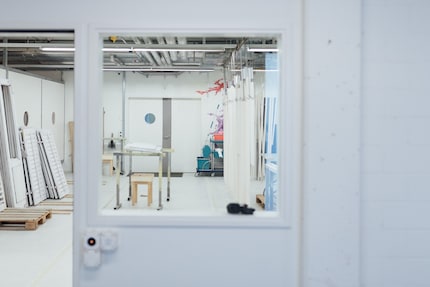
Two master craftsmen and twelve prisoners work here from Monday to Friday. A diverse bunch of men: from young to old, blond to dark-haired, tall to short. «Five different nationalities are united in our studio,» master craftsman Sandro Tschumi explains. The prisoners do everything from stripping wooden furniture to spray-painting them. They specialise in refurbishing window shutters. «Refurbishing window shutters isn't lucrative enough for most paint shops, but in this prison, we have time to do so,» says Christoph Hug, head of a total of 18 trades. In addition to the painting studio, there's also a carpentry, a basketry workshop, a printing office and a locksmith's shop. They receive orders from private customers, but mainly mass production orders from companies. Hardly any of the prisoners are trained in these crafts. They learned every work step from scratch: «Everyone is responsible for one work step, which is executed to perfection,» Tschumi says.
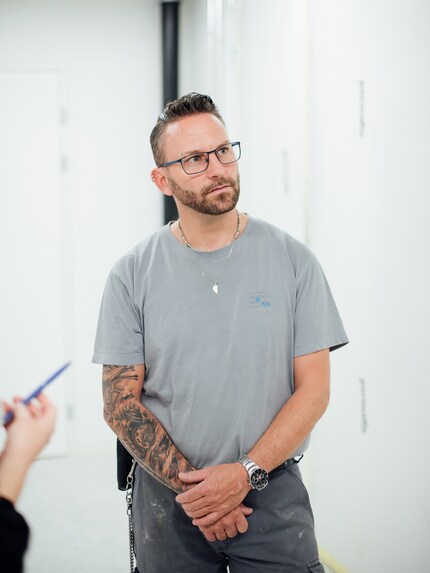
When window shutters arrive in the studio, the first step is to strip any paint or varnish off the wood. The window shutter is placed in a caustic soda bath at 50 to 60 degrees Celsius and remains there for about 30 minutes. After this, a prisoner in rubber boots, gloves, an apron and face protection washes the shutter down with water. «Lye is corrosive and must not come into contact with skin,» Tschumi explains. The shutter then ends up in an acid bath before being washed clean again. After this, it needs to dry thoroughly.
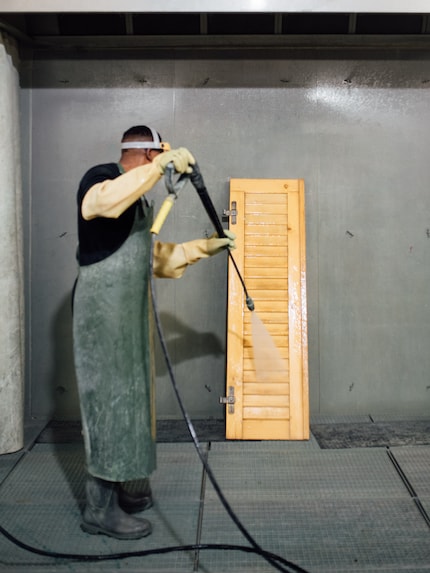
The square drying room smells like a sauna. Having said that, why would it smell any differently, it’s the combination of warmth and wood after all. The shutters and other wood crafts stay in here for up to two weeks. «This is gentler on the wood than quick drying. And if there's anything we have in abundance in prison, it's time,» Tschumi points out. For the prisoners, working here doesn't only mean earning money, it also means having something to do. If you're not working, you're in your prison cell. For most, this isn't a pleasant place. «Working is almost a privilege, even if it's mandatory. Anyone who can't fit into the workplace loses this privilege,» Hug tells me.
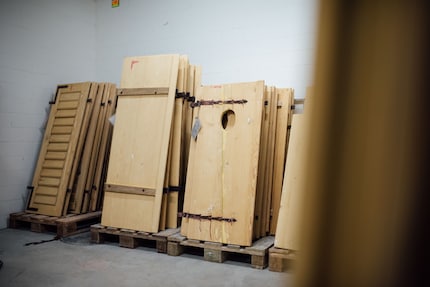
Ali K., who will be released in just over a month and works as a spray painter, shares this opinion. «Spending a regular weekend in your cell is okay. Sometimes it's nice to have time to yourself and not always speak about the same topics like who's released when. But if there are extra days off after a weekend, bank holidays, for instance, it's not easy. That's when you start feeling bored and lonely.» This, although cell visits are possible on a weekly basis. «We can make a request to spend time on Saturdays between 16.30 and 20 o'clock in a cell with four people,» Ali K. tells me. He goes on to say that they often watch TV or cook together. By the way, neither of these activities is free of charge. «We pay for the gas for cooking and the TV rent from our wages,» Ali K. tells me.

Ali K. doesn't only like cooking with others, he also enjoys cooking on his own – even though three meals a day are served. «I'm not a great fan of the dinners here, I must admit. We have continental breakfast for dinner. After a day’s work, that’s just not enough for me. That’s why I cook my own dinner on a gas stove in my prison cell every other day. He orders any ingredients which aren't available from the in-house kiosk from the shops. «Prisoners put everything they'd like on a shopping list. Prison employees then go and buy and pack the products,» Tschumi explains. This is what Ali K. spends most of the money he earns on. Cigarettes follow in second place. He can buy them at the small kiosk inside the prison and pay in cash. 40 percent of his salary is paid in cash; 25 percent are paid into an account from which, for example, TV rental and telephone calls are charged. The remaining 35 percent are placed in a blocked account. Once prisoners are released, this money is given to them as seed money.
For most prisoners, sanding is the first job they take on in the painting studio. This work requires the least skill and ability. «But it's also the dirtiest work and pays the least,» Tschumi adds. At Lenzburg prison, wages are based on behaviour at the workplace and the level of difficulty of the job that's carried out. Those who do a good job are promoted sooner or later. «The timing of promotion depends, among other things, on how many places become available as a result of releases or trade changes,» Tschumi says.
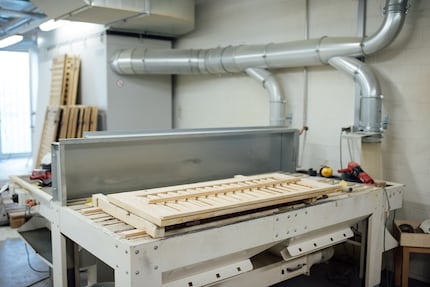
Ali K. has put in a lot of work. Spray-painting is the most demanding of all painting jobs and therefore comes with the highest wage. Tschumi is also impressed with the quality of his work and his motivation: «Ali K. wants to do a good job. He's even completed practical training here.» Practical training isn't the same as an apprenticeship, but it shows that Ali K. has acquired practical and theoretical knowledge about spray-painting.
«Every two weeks, a trade school teacher gave me a few lessons.» Ali would like to keep on working as a spray painter after he’s released from prison. But the future will show if this is possible. He will be deported to Turkey immediately after he is released. «I've lived in Switzerland since I was ten years old. This is where my whole family lives. I have no connection with Turkey,» he says. There is no anger or resignation in these words, which surprises me. «Of course it'll be hard, but I won't let it get me down. Pessimism has rarely helped anyone. If working as a spray painter doesn't work out, I'd like to work in tourism.»
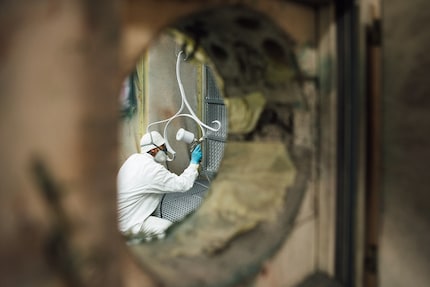
Tschumi helped him adopt this attitude. «We have a good relationship. He's always there when someone needs support or new challenges,» Ali K says. I'd like to know from Tschumi if he finds it difficult to remain unbiased in some cases, knowing what crimes the prisoners have committed. «Everyone here has been convicted. It's not up to me to do that. I see humans, not criminals.» He made a conscious decision to combine his profession as a painter with social work and therefore completed an extra-occupational training as a prison employee. He's been working in Lenzburg prison for eleven years now and enjoys his job.
Many prisoners are unfamiliar with the concept of professional education. "The majority never completed an apprenticeship and are experiencing a structured work day for the first time in their lives,» Hug explains. Prisoners have to abide by rules even in the little free time they have. «If you sign up for the gym, for instance, you need to go regularly or you're not allowed to keep going.» This is how they are taught that agreements are binding.

As we slowly proceed to the next room, I realise how quiet it is in the painting studio. There's no talking, no laughing. «It's only this quiet because you're here. Usually, there's a lot of joking around,» Tschumi says with a smile. Then he explains what scraper work involves. «Every imperfection needs to be taken care of. Each window shutter is placed on two folding trestles. A prisoner has to even out all flaws with beige filler before the shutter is sanded down again by hand, making sure there are no surface irregularities. After this, the shutter is spray-painted,» Tschumi adds.
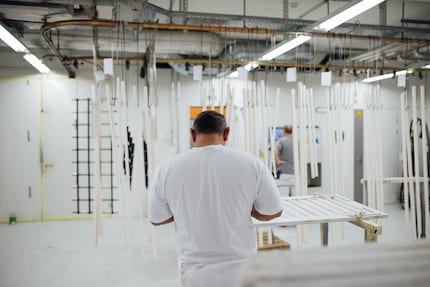
Before they can be stray-painted, the shutters are hung on something that looks like a butcher's hook and are pulled into a small room by a rail system. Ali K. is spray-painting the legs of a bench in silver. While he's doing his work in protective clothing, I'm standing in the spray-painting room in my usual clothes and am feeling a little dizzy from the fumes. The material store next door also smells of paint and varnish. «You get used to it. More than that – you almost need the fumes after a while,» Tschumi jokes.
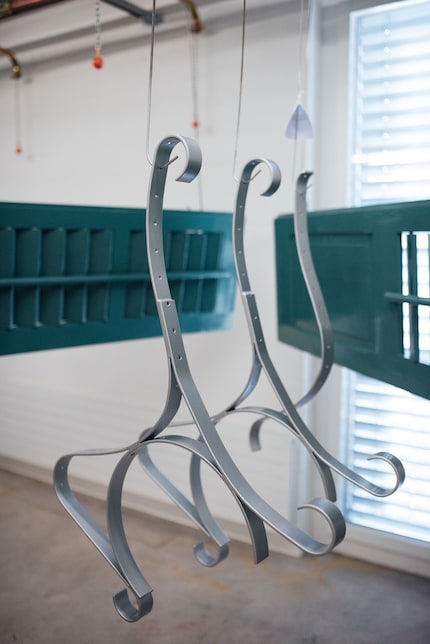
Once they've been spray-painted twice, the bench legs re transported to the drying room via the rails. There are many shutters in a wide variety of colours there, too. «This reminds me of an installation I saw at Milano design fair,» says photographer Thomas, who's accompanying me. It's a contrast to the rest of the painting studio, which seems rather sterile with its white walls, white work clothes and white lighting. Every Monday or Tuesday the drying room is emptied and all the goods are brought to the dispatch room. We enter the dispatch room and I see an old buffet. «That's an heirloom. A private client asked us to refurbish it,» Tschumi states. The painting studio of JVA Lenzburg prison also accepts these kinds of jobs, although they’re rather demanding: «I wouldn’t ask most prisoners to do such a big job. There’s too great a danger of something going wrong.»
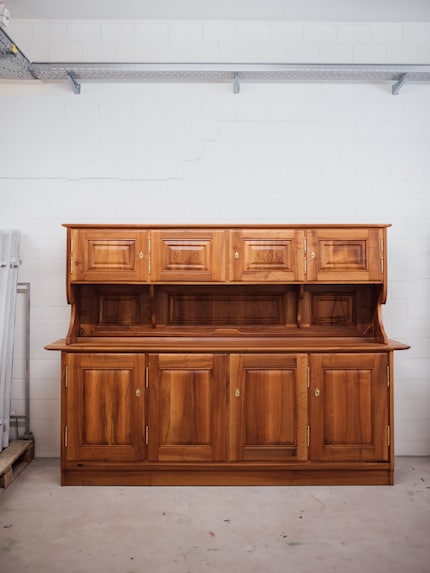
At that moment, the second master craftsman enters the room. He tells us that a little cupboard in the corner isn't being picked up after all. «The lady who owns it couldn't overcome her fear to drive up to the ramp and pick up her furniture,» he adds. It's at this moment that I remember where I am. As normal as every work step seems and every conversation sounds, once they finish work, the employees of this painting studio don’t go for an after-work drink with their friends. They go back to their prisons cells. A concrete wall, two fences and thick iron bars are between the prisoners and the outside world.
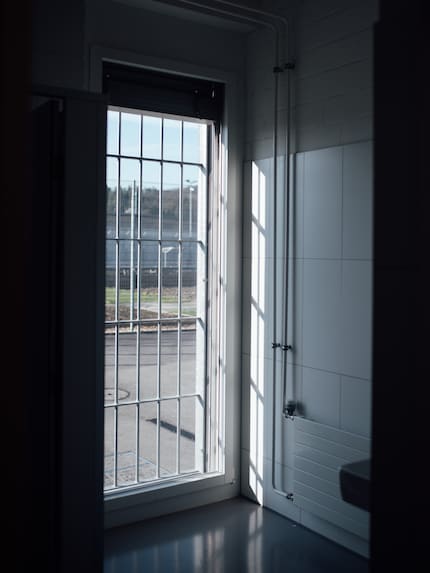
My life in a nutshell? On a quest to broaden my horizon. I love discovering and learning new skills and I see a chance to experience something new in everything – be it travelling, reading, cooking, movies or DIY.
Interesting facts about products, behind-the-scenes looks at manufacturers and deep-dives on interesting people.
Show all